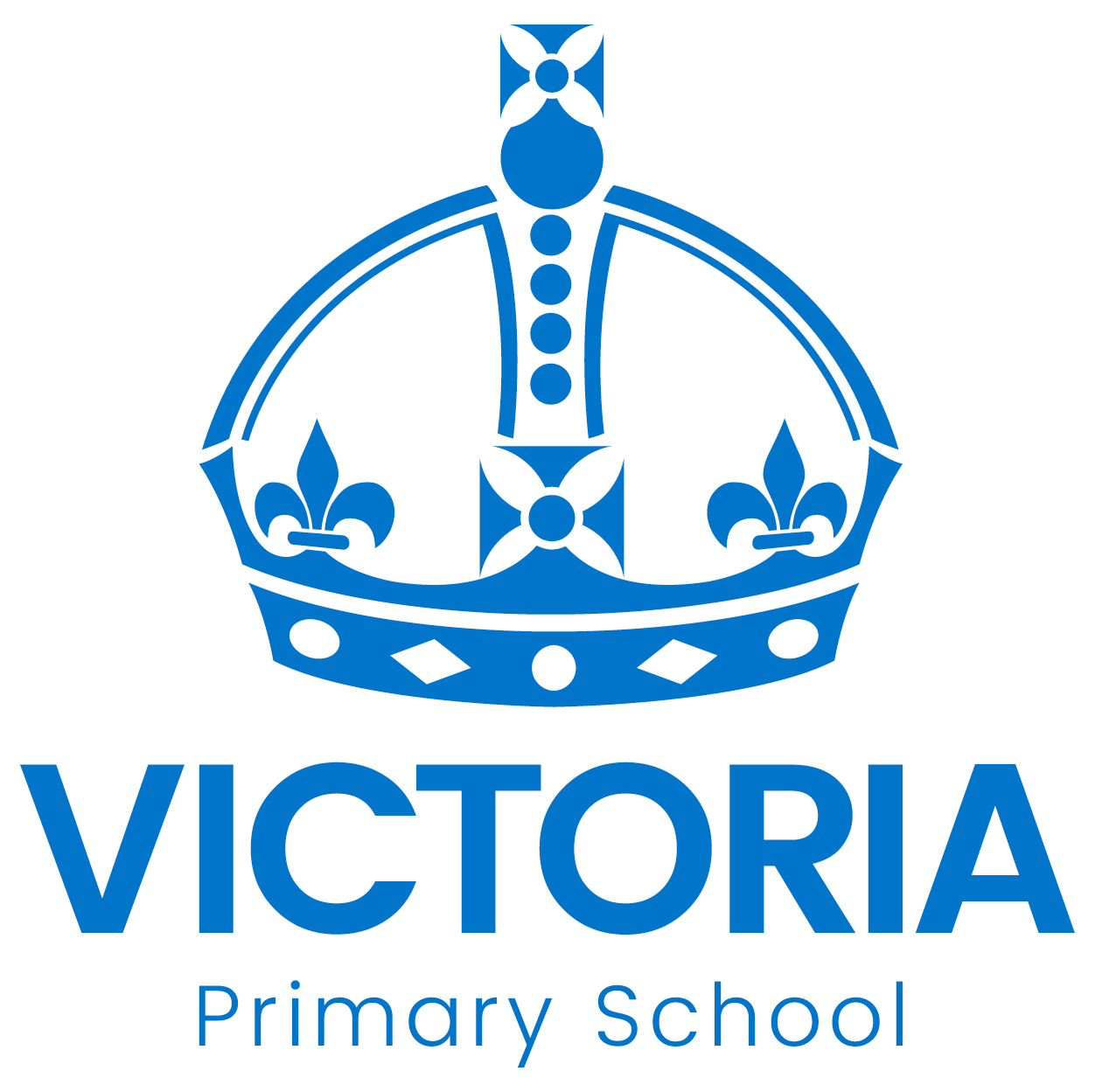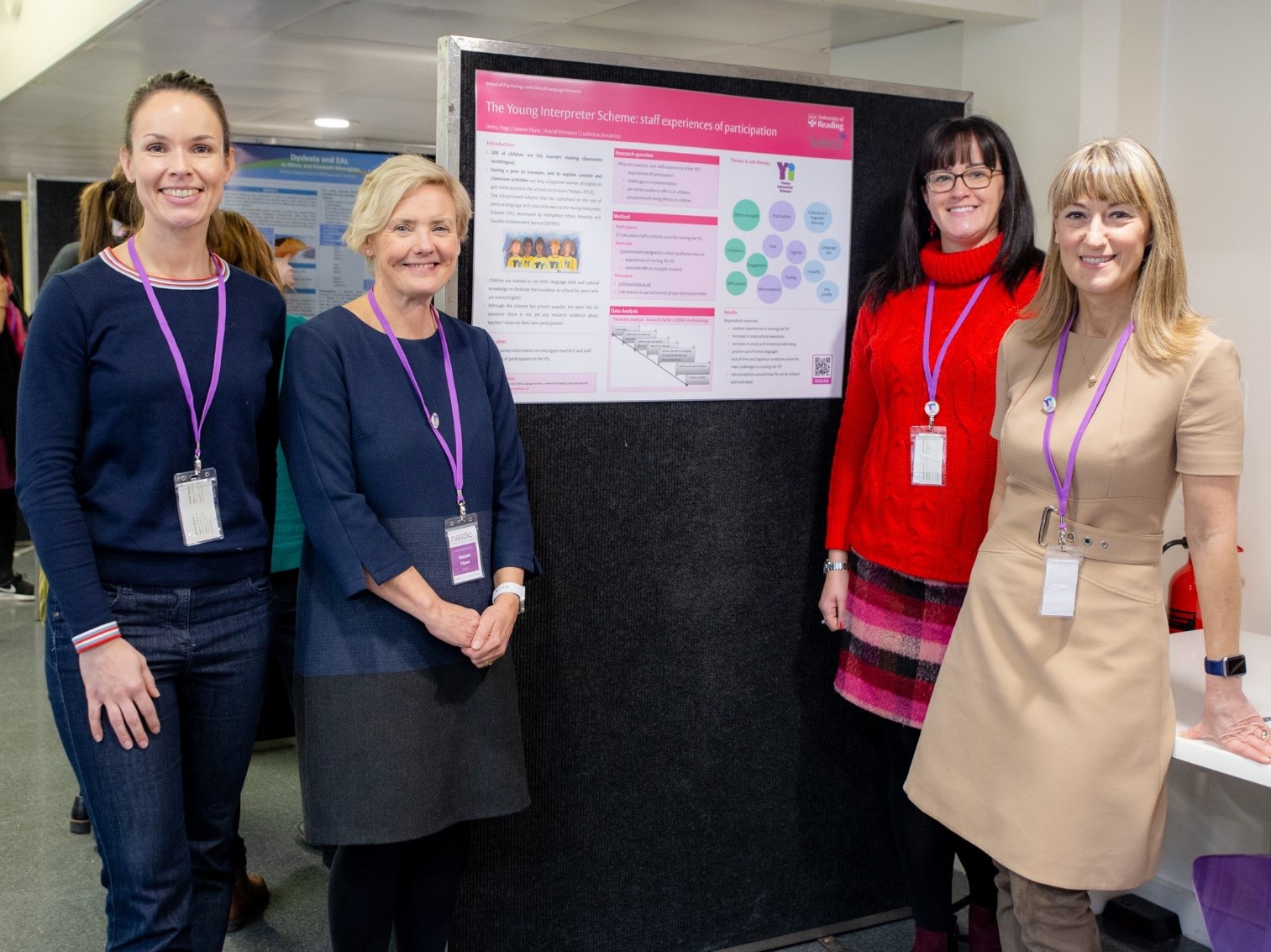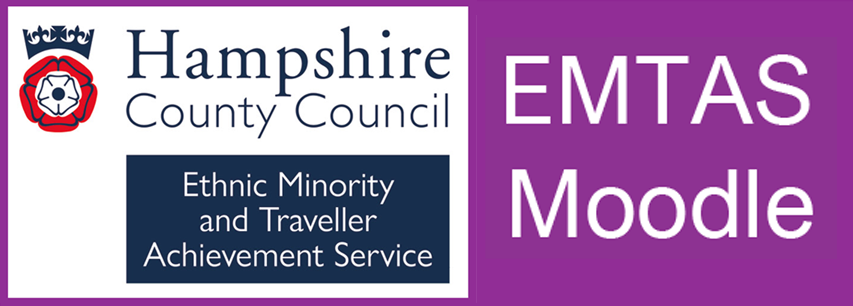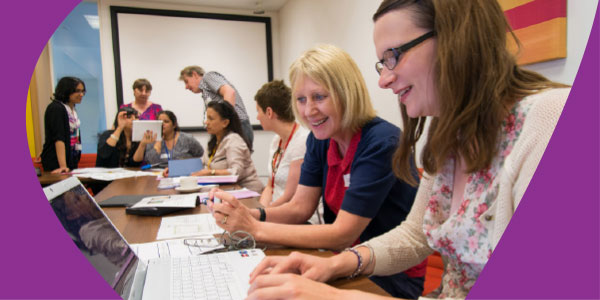Site blog
Anyone in the world
By Hampshire EMTAS Polish-speaking Bilingual Assistants Magdalena Raeburn and Katarzyna Tokarska.
Have you ever felt frustrated or out of your comfort zone because of communication barrier? Have you been on holiday abroad and found it tricky to explain what you need to your local shops, hotels or restaurants?
Imagine now, how much more complex and difficult a situation of an EAL child in a UK school might be. Try to put yourself in their shoes for a while… They come to the UK not for a holiday and not out of their own choice. They have to challenge themselves against a new language, new culture and a local community as well as the unknown school set of rules and regulations.
EMTAS Empathy Training will help you understand the complexity of the challenge that the EAL child faces every day. The aims of the session are:
- To increase awareness of the challenges that EAL learners face in the UK schools
- To give an insight into Polish learners’ cultural school differences
- To share ideas of how to approach the most common challenges experienced by the EAL learners.
During the training you will have a chance to become an EAL learner in a Polish classroom by taking part in a practical group activity on the geography of Poland. You will be expected to understand the teacher’s presentation, participate in a variety of activities, including group work, match the pictures, read and follow instructions as well as answer questions.
Would it be ‘only’ a language barrier…?
The training participants concluded that acquiring the language is only a part of the bigger picture. Cultural traits, local history, geography and customs are also a part of learning when they are trying to integrate into the new reality.
Our ‘students’ admitted that it ‘really made (them) consider other barriers than language’.
They also discovered that the manifested child’s behaviour in the classroom might have different roots rather than the ‘obvious’ ones… One of the participants said: ‘Very useful to understand how they would/could come across as ‘naughty’ or ‘distracted’’. It was an eye-opening experience.
Our workshop attendees revealed that their ‘survival’ strategy during the session was to answer ‘yes’ to any teacher’s attempt of communication. Have you got such EAL children in your classroom? Our workshop ‘students’ said it was their technique to use to be left alone rather than having to participate in the activity they do not feel competent or confident with. Our participants also felt ‘frustrated’, ‘confused’, ‘not very clever’ and ‘wanted to avoid being asked’. They were ‘easily disengaged’, ‘embarrassed when put on the spot’, ‘wanted to give up’ and ‘finally turned off’.
The session was an opportunity to face your own emotions as well as share the strategies, resources and ideas. Some strategies could involve researching information on the EAL child’s culture, educational system as well as taking your pupil’s personal experience into account.
When the EAL children join the UK classrooms, they need more than technicality of the language and pedagogical strategies. They need our empathy at every step of their challenging, new journey.
Take part in our empathy exercise at the Basingstoke EAL network meeting on January 28th. Limited spaces available and free to Hampshire maintained schools. For enquiries, please contact Lizzie Jenner, lizzie.jenner@hants.gov.uk.
Subscribe to our Blog Digest (select EMTAS).
[ Modified: Wednesday, 22 January 2020, 4:41 PM ]
Comments
Anyone in the world
In this new blog, Annie Kershaw shares her experience of using the EAL Excellence Award and Young Interpreter Scheme to develop practice at her school in Nottingham.

I am an EAL Co-ordinator for an inner city School in
Nottingham - Victoria Primary School. The headlines for our school are:
- The proportion of pupils from minority ethnic backgrounds is well above the national average.
- There are 33 languages spoken at the school.
- The rate of pupils’ mobility is well above the national average.
- The proportion of pupils who are disadvantaged is well above the national average for primary schools.
In 2018, in response to the Local Authority cuts leading to a much reduced central service for supporting schools with EAL and BME achievement, Nottingham City sent out a request for experienced practitioners to apply to become an Advanced Practitioner of EAL (APEAL); The LA would provide specialist training and support for the APEALs and in return they would complete an in-school EAL audit and action plan, identifying current examples of best practice, an action research project, write up the report for publication on the LA website, and the APEALs would each deliver a workshop at the Local Authority EAL Annual Conference. In exchange, the APEALs received consultant support and training from the Local Authority, a network of cross-phase peers for support and specialised professional development, and access to the Hampshire EMTAS Moodle.
As EAL Co-ordinator, the Moodle was just what I was looking for. I quickly engaged with the e-learning packages for myself and for colleagues and it was great having a tool to hand which confirmed and supported our good practice in school. One of our proudest achievements was finding a way to formalise the support and training for our ‘Language Ambassadors’ through the Young Interpreters Scheme. We had already nominated children to undertake the role and asked them to do some tasks informally, but this really gave us, as a school, a structure to develop their role further, some well thought out materials to use in their training and an end goal through awarding certificates and badges. In fact, the role of the Ambassadors was recently acknowledged in our OFSTED inspection:
“Staff promptly assess the stage in learning English when pupils start school and tailor language development accordingly. They are assisted by 10 ‘Language Ambassadors’. These are pupils who have completed the accredited ‘Young Translators’ training and support other pupils, their families and staff.”
Finally, as with many of my increasingly isolated EAL Co-ordinator colleagues, I am always reflecting on whether my practice is ‘correct’ and ‘current’ or not. For me, validation for my school and for my own role came in the form of the EAL Excellence Award, developed by Hampshire. As a school, we decided to pursue the award as we accept that EAL is a big part of our identity and that we had made a lot of progress in recent years with our practice; the award seemed to us to be a good way to acknowledge that progress and a useful tool to raise the EAL profile of our school. As EAL Co-ordinator, it gave me a real structure for evaluating where we are, and how we can keep improving and moving forward with our practice in school. My colleagues were positive and encouraging and, when needed, were more than happy to provide the evidence and the support for me.
We were delighted to receive the Silver Award recently and I am already mentally preparing for our journey to Gold! The ‘Gold’ criteria has motivated me to think more holistically around our Parental Engagement and how we can make steps in this area. I look forward to the challenge!
Visit the Hampshire EMTAS website to find out more about the EAL Excellence Award and Young Interpreter Scheme.
Subscribe to our Blog Digest (select EMTAS).
[ Modified: Wednesday, 8 January 2020, 5:02 PM ]
Comments
Anyone in the world
By Mariana, Young Interpreter at Cherrywood Community Primary School
Hello everyone. My name is Mariana and I am ten year old. I am writing to share my experiences during the responsibility being a young interpreter for the last two years. I signed up because I like providing additional support to pupils who are learning English as an additional language.
When I was young, I went through the same thing as the pupils who I have worked with in the past terms. They did not know how to speak a lot while still needing help to join in. When I came into pre-school and Ash I did not know how to speak to people however luckily I had help from adults and even other children.
I strongly believe that I was chosen for this role because of my ability to communicate and help the other children to integrate in with their class and mates. I am also confident and do a lot of extra work around other languages.
On my first year of young interpreters all of us had special training to understand what we had to do in the different situations which might happen with Mrs Tagima, a very kind lady. Some of the things we done were playing a matching game around different countries, creating a map around us so we could learn new things around everyone and creating scenarios on situations and how we should act.
Last year I worked with a boy in year 1 which was from Nepal and this year I accepted a challenge by working with a new boy from Romania which cannot speak a lot of English.
During the role I have done lots of things which evolve:
- Helping them join into their PE lesson.
- Doing their work with them.
- Making sure that they understand.
- Helping with counting and reading.
Each year I enjoyed and had challenges to do with this role. Some of the things I found quite tricky were speaking and helping the boy because he nods but sometimes did not understand. I enjoyed quite a lot of things but here are some:
- Joining in with them.
- Helping them join in in class.
- Seeing their smiling faces.
Thinking of the book and game I made was easy. When I was in reception class my mum made a book for me to join in more. As for the game, when I was little I had a game like that so, when I observed him in class to see what he needed, I remembered that I could make him something like that to help him.
The games and books are to boost his confidence while learning English. As for one of the games, it is used to help him with his class work. Incredibly, I made the games only with household objects. My friend (Romanian) helped me translate English to Romanian.
You play the games by matching the words and numbers to their correct pairs. The book is really just to boost his confidence (like a picture translator).
Thank you very much for reading. I strongly hope you understand why I wrote this blog.
Thank you!
Mariana on behalf of the young interpreters at Cherrywood Community Primary School
Find out more about the Young Interpreter Scheme on the Hampshire EMTAS website.
[ Modified: Monday, 16 December 2019, 2:53 PM ]
Comments
Anyone in the world
In a previous blog, Masters candidate Debra Page launched a questionnaire aimed at exploring staff experiences of the Young Interpreter Scheme. Now officially a PhD student after successfully completing her Masters with a distinction, Debra updates us on the results of her questionnaire.
Hello readers. I hope that you’re familiar with my name by now, but if not I am conducting research on the Young Interpreter Scheme under the supervision of the Centre for Literacy and Multilingualism at the University of Reading and with Hampshire EMTAS as a collaborative partner. My Masters research dissertation looked at staff experiences of the Young Interpreter Scheme with a specific focus on motivation for participation in the scheme, views around teaching pupils with EAL and effects of running the scheme on children, staff and schools. Thank you to all that completed the questionnaire. The results are in! Findings are grouped within 5 main themes:
- Empathy, self-esteem and self-concept
- Opinions on home language of pupils with EAL
- Intercultural awareness
- Misconceptions surrounding concepts and use of Young Interpreters
- Effects on academic achievement
To find out more, download the summary by clicking the link attached to this article (see top right). You can also discover findings in a poster which the team and I presented at the recent NALDIC conference; here we are in action:

From left to right: Astrid Dinneen, Naomi Flynn, Debra Page and Ludovica Serratrice
We also were involved in making promotional videos for collaborative funded studentships, can you spot any of your Young Interpreters in the videos?
What’s next?
Stay tuned!
If you have any questions about
the research please email me – debra.page@pgr.reading.ac.uk.
Subscribe to our Blog Digest (select EMTAS).
[ Modified: Wednesday, 4 December 2019, 4:00 PM ]
Comments
Anyone in the world
In a previous blog, Claire Barker and Astrid Dinneen discussed the benefits of setting up the New Arrival Ambassador and/or Young Interpreter Scheme for different groups of pupils. In this blog Louise Ret, Acting Principal Teacher at Gylemuir Primary School in Edinburgh, shares her experience of working with New Arrival Ambassadors to welcome a range of children joining school part-way through the year.
Gylemuir Primary is a non-denominational school located in Edinburgh. We have 570 pupils who come from a diverse range of faiths, cultures and countries. Over the past several years we have seen an increase in the number of pupils joining the school during the academic year, including pupils with English as an Additional Language. This is in large part due to the fact that our local community comprises many large banks and businesses that recruit staff from overseas, usually on a 2 year basis.
Moving
to a new school is challenging for any child, even if it’s five minutes away
from their current setting – but many of our families are also contending with
language barriers, an unfamiliar curriculum and a new job, often without the
support systems of family and friends. It became clear that we needed a way to
make families feel welcome and supported when they arrive at Gylemuir. We chose the New Arrival Ambassador
Scheme because the resource offers support to a range of pupils –
including non-EAL pupils who join our school at irregular times in the school
year.
The
New Arrival Ambassador scheme has been a fantastic resource for the school
because it offers a structured approach to training pupils in peer mentoring.
In 2018 the pupils went through an application and interview process to gain a
spot as an Ambassador and this year they have taken ownership of recruiting new
Ambassadors by creating their own application form and interview questions. We
had over fifty applicants from P5-P7, proving that the children see this as an
exciting and worthwhile role.
As
soon as a new pupil arrives at Gylemuir they are given a tour of the school by
our Ambassadors. At break and lunch time the Ambassadors find their new arrival
and buddy up with them to play games and explore the playground. They are
always on hand to offer support and guidance, and we all check in with each
other at weekly meetings to share how our new arrivals are getting on and offer
ideas on how to support each other. We are always looking at ways to improve
and expand the role of the Ambassadors – recently this involved working with a
group of teachers from Holland who were visiting our school!
Whilst the
scheme has helped pupils with English as Additional Language, it also provides
support to pupils who have moved from within Edinburgh. A new pupil recently
arrived from another school in the area and not only has she been helped
by the Ambassadors, she has now become an Ambassador! Having someone on hand to
welcome her allowed her to find her place in Gylemuir quickly and confidently.
Ultimately,
pupil wellbeing is at the centre of the scheme. Having an Ambassador buddy
means that pupils are nurtured, respected and included from the moment they
arrive at Gylemuir. For the Ambassadors themselves, the role offers an
opportunity to demonstrate their ability to be responsible and achieve success
in the wider school setting.
The
best part of the New Arrival Ambassador Scheme has been seeing how enthusiastic
the pupils are about their role. They take so much pride in sharing and
embodying our school values of Welcoming, Supportive, Creative and Happy and
encourage everyone in the school to do the same.
Louise Ret, Acting Principal Teacher at Gylemuir
Primary School
Twitter: @MissRet1 @gylemuirprimary
Visit the Hampshire EMTAS website to find out more and sign up to the New Arrival
Ambassador Scheme. Read this blog to learn more about the similarities and differences between the New
Arrival Ambassador Scheme and the Young Interpreter Scheme.
Subscribe to our Blog Digest (select EMTAS).
[ Modified: Wednesday, 4 December 2019, 9:26 AM ]
Comments
Anyone in the world
Dawn Walters, Year R Team Leader at Hook Infant School, shares the exciting activities she planned as part of a Romany Gypsy Day she organised for her class.
Visit the Gypsy, Roma and Traveller (GRT) pages on the Hampshire EMTAS website.
Subscribe to the Blog Digest (select EMTAS).
[ Modified: Monday, 4 November 2019, 3:27 PM ]
Comments
Anyone in the world
By Hampshire EMTAS Specialist Teacher Advisor Jamie Earnshaw
A huge congratulations to all students who achieved a GCSE in a Heritage Language this summer! EMTAS supported 48 students with GCSEs in Arabic, Chinese Mandarin, German, Greek, Italian, Polish, Portuguese, Russian and Turkish.
Here are all the fantastic results
achieved by students we supported:
GCSEs graded 9-4
|
Language |
9 |
8 |
7 |
6 |
5 |
4 |
|
Arabic |
2 |
1 | ||||
|
German |
1 |
|||||
|
Greek |
1 |
1 |
||||
|
Italian |
4 |
3 |
||||
|
Mandarin |
3 |
1 |
||||
|
Polish |
7 |
3 |
2 |
1 |
1 |
1 |
|
Russian |
2 |
1 |
2 |
|
||
|
Total |
18 |
9 |
4 |
2 |
2 |
1 |
GCSEs graded A*-C
|
Language |
A* |
A |
B |
C |
|
Portuguese |
2 |
4 |
2 |
1 |
|
Turkish |
1 |
1 |
1 |
|
|
Totals |
3 |
5 |
2 |
2 |
As you can see, students did extremely well this summer. Many students achieved the top grades and there were individual stories of success across the board too, including one student who did really well who was previously referred to EMTAS when in primary school and was later diagnosed with SEND with difficulties in reading and writing. Even with an uneven profile of skills across Reading, Writing, Speaking and Listening, with support and hard work, students can still succeed and achieve a grade at GCSE. Also do note that we offer an initial one session package of assessment to help determine if a student is ready for the GCSE.
Many of the students we supported this year were in Year 11 - we wish those students good luck with their next steps! No doubt the Heritage Language GCSE will be a bonus for those students to show to future colleges or employers. Do bear in mind though it is not necessary to wait until a student is in Year 11 to enter them for a Heritage Language GCSE but sometimes the themes of the exams are better-suited to older students (so perhaps most suitable for students in Year 9 onwards).
Visit
the GCSE page on our website for more information about the
GCSE packages of support we
offer to help prepare students for Heritage Language GCSEs. When you have
decided which package you want, ask your Exams Officer to complete the GCSE
Support Request and GCSE
Agreement forms and return them both to Rekha Gupta
using the address details provided on the GCSE Support Request form (by the
deadline of the 1st March 2020).
We look forward to working on Heritage Language GCSEs with you and your students this academic year!
[ Modified: Wednesday, 12 July 2023, 12:04 PM ]
Comments
Anyone in the world
Sarah Coles shares the fourth instalment of a journal-style account of her reading for the literature review and methodology chapters of her PhD thesis.

12th October 2018
Continuing with my reading, this time I write again about interviewing, as it seems there is no end to the number of articles devoted to this particular subject. I read one about interviewing dementia care-givers, a cheery little number. Whilst you might not immediately think there’d be many parallels, I found there was much to gain from it, mainly to do with thinking about respondent vulnerabilities, ethical considerations and how to get the most out of an interview situation when you are really expecting people to talk about some highly personal stuff to a someone they barely know. A lot of this boils down to knowing your interview schedule really well (that’s the list you prepare in advance of the key things you want to cover in the interview). It was found to be off-putting if the researcher had to refer to a list as this seemed to depersonalise the interview experience for respondents, causing them to stop giving full, descriptive accounts of their experiences – so clearly it had an impact that was entirely at odds with the researcher’s aims and as such is a useful tip I shall be taking on board. Also, and in a similar vein to guidance we are periodically given relating to dealing with safeguarding concerns and disclosures, it is advised that one avoids asking leading questions and instead asks people to describe their situations. O’Connell Davidson and Layder (1994) suggest that in qualitative approaches to interviewing, the researcher should be prepared to respond flexibly to whatever the respondent may say and should maintain a strong focus on listening and encouraging talk rather than on ensuring all the questions they have prepared are covered. Their book, ‘Methods, Sex and Madness’, is an entertaining caper through issues of gender identity, sexuality and witchcraft, all linked to research methods. I find it a refreshing change from the way research methods are discussed in more traditional academic writing, and it certainly raises some important points to ponder in relation to my own research. These points are reiterated by a guy called Seidman writing in 2013, who advises that in-depth, qualitative interviewing should have as its goal to encourage respondents to reconstruct and express their experiences and to describe their making of meaning, not to test hypotheses, gather answers to a set of pre-determined questions or corroborate opinions. Seidman goes on to expend some wordage decrying the use of the word ‘probe’ in favour of ‘explore’, which is the point at which I had to go and make a cup of tea. The last advice I need to take from this week’s reading is to listen more and talk less. This I will endeavour to practise at work, and I have asked colleagues at EMTAS to let me know how I get on. I am fairly certain I will find it particularly challenging, and I can already hear those of you who know me well chuckling quietly as they are very well aware that I can talk for England and many other countries besides, given the opportunity.
2nd
November 2018
Undaunted
by the lack of feedback on my academic ramblings, I shall persist as I am sure
at least two of you will be properly interested in this week’s topic, which is
the concept of ‘semi-lingualism’.
This
pejorative term has been used to describe an individual whose first language
has not developed fully in that they are not considered to be ‘proficient’
users of that language. When introduced to another language, such an
individual would not be able to reach ‘proficiency’ in that language either,
lacking the linguistic framework yielded by proficiency in the first language
on which to hang the new language. Or so the theory goes. This
being the case, rather than becoming a ‘balanced bilingual’ (more on that
nebulous notion in a future edition) with comparable ‘proficiency’ (ditto) in
both languages, such an individual would never attain proficiency in
either. Scary stuff indeed.
Several
inherent difficulties push their way to the fore here. The first is that
there is no universally accepted definition of ‘proficiency’ in either a first
language or a subsequent one. In the US, there have been attempts to
measure first language proficiency and MacSwan (2005) discusses the use of
various ‘native language’ assessment tools in the US to determine the
proficiency of speakers of Spanish as a first language in particular. For
MacSwan, there are issues with construct validity with these tests. How,
he questions, can such a test assess a child brought up in a monolingual,
Spanish-speaking household as a “non- or limited speaker of Spanish” given that
the child has no attendant learning difficulties and given what we know about
language development 0-5 years? A review of the types of questions asked
in these tests and the test rubric itself demonstrates a strong bias towards
answers given in full sentences. For instance:
|
Item |
Required student response |
Prompt |
[What is the boy doing?] |
El (niño) está leyendo/estudiando. [The boy is reading/studying.] |
Picture of boy looking at book |
In the above example, most people would give the response “Leyendo” or “Estudionado” (“reading/studying”) rather than responding using a full sentence – and they would be rewarded with a score of zero for this. MacSwan suggests that to give an answer to that particular question using one word reveals “detailed covert knowledge of linguistic structure”, which sounds terribly learned. To what MacSwan says I will therefore add my own two penn’orth and call it an example of “linguistic economy” – a new concept I have just invented to describe beautifully succinct language use in which no syllable is superfluous yet the full meaning is evident. Add to these observations the fact that we only learn about the ‘need’ to answer in full sentence in school, where these US tests are used prior to a child being admitted to full-time education, and a picture begins to emerge of Spanish-speaking children in various states in the US being found linguistically wanting and in consequence penalised and denigrated for having poorly developed first language skills before they have even got off the starting blocks. Furthermore, it is widely held that children exhibit from an early age complex knowledge of such language-related things as word order, word structure, pronunciation and appropriate use of language in particular situations, whatever their first language may be. Most children achieve this by the age of five, in fact, bar perhaps just the latter stipulation which brings to mind those priceless examples drawn from one’s observations of one’s own child’s completely inappropriate use of language in various public fora. Do please send in your own examples of these as mine, which took place at Marwell Zoo just outside the zebra enclosure, is unrepeatable in this context. Back to the matter in hand and for MacSwan, then, it is not the child’s first language proficiency that is being measured with the test question above; it is the child’s ability to suspend his pragmatic linguistic knowledge in favour of compliance with an arbitrary requirement to couch an answer in a complete sentence - in itself an unrealistic requirement, given the child has yet to start school. Hence definitions of ‘language proficiency’ and the ways in which this might be measured are open to debate and, in consequence, so too is the concept of ‘semi-lingualism’ for which I for one am thankful.
Keep tabs on Sarah's journey using the tags below.
[ Modified: Monday, 30 September 2019, 12:10 PM ]
Comments
Anyone in the world
In their last blog article published in the summer term, the Hampshire EMTAS team concluded the academic year with a celebration of their schools’ successful completion of the EAL Excellence Award. Now feeling refreshed after the summer break, the team look forward to the year ahead.
EAL Excellence Award
Our work supporting schools to develop and embed best practice for their EAL learners through the EAL Excellence Award continues. Surgeries will be held to help colleagues get ready for Bronze level and many of this year’s network meetings will focus on aspects of the award which practitioners need to develop for the next level up. For example, many schools will want to work on planning for the use of first language as a tool for learning this year (more on this in a future blog). See the EMTAS website for more information about the Award and how you can introduce it in your school or setting.
GRT Excellence Award
Following the success of the EAL Excellence Award, we have developed a similar award to support schools who have Gypsy, Roma and/or Traveller pupils on roll. At present, we have eight schools piloting the GRT Excellence Award and working towards getting their accreditation. To find out more, please contact: claire.barker@hants.gov.uk
NALDIC Berkshire & Hampshire Regional Interest Group (RIG)
NALDIC is the National Association for Language Development in the Curriculum and has an EAL remit. Part of the work of NALDIC is to run Regional Interest Groups (RIGs) across the country. Many of you may have heard that Dr Naomi Flynn is giving up her role as convenor of the Berkshire and Hampshire RIG. Whilst we are sad as this means we will see less of Naomi, we are also excited that the responsibility will now be shared between Portsmouth EMAS, Dr Anna Tsakalaki at the University of Reading and ourselves at Hampshire EMTAS! We wish Naomi all the best in her new role of Events Chair for NALDIC and look forward to working with our new co-convenors.
Network meetings
EMTAS network meetings are a great opportunity to meet colleagues with an interest in EAL practice and provision, to share ideas and to access input and take part in discussions on a range of EAL-related issues. These termly meetings are free to Hampshire maintained schools; staff from academies or the independent sector are also welcome to attend for a small charge. To find dates and information about how to register for a network meeting near you, see the Training section of the EMTAS website.
EAL E-learning
Our EAL E-learning has been given a complete overhaul this year to bring it up to date. The modules will now play even better in the Chrome browser and are optimised for seamless delivery over mobile devices. Check out our latest module on the ‘Role of the EAL coordinator’ and look out for new modules being developed this year.
SEAL (Supporting English as an Additional Language)
Due to popular demand, this course is running again starting in October 2019. It is a training programme for support staff and EAL co-ordinators to help them build up their knowledge of EAL good practice and pedagogy and has a strong focus on practical strategies to support pupils with EAL within their school environment. The course covers best practice in the classroom, SEND or EAL?, assessment, working with parents of children with EAL and the latest digital technology and resources to support learning in the classroom. If you are interested in signing up for this course, please check details on our website.
NALDIC Conference
This year the NALDIC conference takes place at King’s College London on 16th November (easy walking access from Waterloo station). The conference title this year is ‘Inclusive practices in multilingual classrooms: assessing and supporting EAL and SEND learners in the mainstream’. The NALDIC conference always has a good variety of workshops to suit all tastes, stands from publishers/resource providers and is a great place to network with colleagues from all over the country.
As you can see there are plenty of opportunities to get involved with EAL this year. We look forward to seeing you at an event near you.
[ Modified: Friday, 4 October 2019, 1:06 PM ]
Comments
Anyone in the world
Last September we kicked off our second year of blogging with an article introducing our new EAL Excellence Award, a self-evaluation tool for schools created with a view to support practitioners in developing EAL practice and provision. As they are about to break for their Summer holiday the Hampshire EMTAS Specialist Teacher Advisors reflect on their work with schools using the EAL Excellence Award in their area.

Getting ready
The award was met with much enthusiasm after its
launch in our blog and during network meetings. Practitioners found it helpful
as a way of mapping out the areas where provision was already strong whilst
identifying areas for development. For example, many schools identified the
need to appoint and train an EAL Governor. They reflected on policies and the
importance of writing a stand-alone EAL policy. The self-evaluation tool also
highlighted staff training needs which we supported through bespoke sessions as
well as our e-learning. Feedback from schools indicated that they found
the self-evaluation criteria relevant and purposeful.
Some
schools have collated evidence into folders to make the validation visit as
smooth as possible. They have used each statement from the EXA as a divider and
then placed any appropriate evidence, such as lesson plans, copies of school
policies or photos of work, into each section. This
made the validation process relatively straightforward since all the evidence
could be found in one place. For one school, the portfolio of evidence was
a piece of work which particularly impressed the Ofsted inspectors.
The validation process
Validation visits were, in most cases, carried
out by a Specialist Teacher Advisor not previously connected with the
school in order to get a fresh take on practice and provision. It has also been great
being able to meet Young Interpreters in some schools and in one school there
was even the chance to meet with the school governor responsible for EAL. This was supplemented by tours to see displays and collections of
resources in the library or in classrooms. One tip for schools thinking
about gaining their own award might be to take pictures of anything ephemeral
like a classroom display and keep them in readiness.
What’s next?
Since the launch of these materials in September there
has been interest from colleagues beyond the bounds of Hampshire. Schools have
already purchased licenses to use the tool within their establishment and EAL
specialists have been trained as validators to work with schools in their
own locality. If you are interested in finding out more, please contact: Chris.Pim@hants.gov.uk.
More materials will be produced to support schools
with gaining their EAL Excellence Award in 2019-20. There will also be training
opportunities to support aspects of the framework which some schools have found
trickier e.g. using first language as a tool for learning. We will also work with our current bronze schools who might be thinking
about developing their practice and provision towards silver.
Building on the success of the EAL Excellence Award,
the EMTAS Traveller Team have introduced a Traveller Excellence
Award that is currently being piloted in eight schools all around
Hampshire. We hope to present our first award early in the Autumn
term. This award helps schools audit their provision for their Gypsy, Roma and Traveller communities and helps to ensure that all
staff are well informed about the different GRT cultures in their
setting. If you are interested in finding out more, please contact: Claire.Barker@hants.gov.uk.
Finally...
We congratulate the following schools for their hard
work in achieving their award:
Bronze
Cherbourg Primary School, Eastleigh
Cove School, Farnborough
Hiltingbury Infants, Eastleigh
Marlborough Infant School, Aldershot
Merton Infant School, Basingstoke
New Milton Infant School, New Milton
South Farnborough Infant School, Farnborough
St John the Baptist Primary School, Andover
The Wavell School, Farnborough
Weeke Primary, Winchester
Silver
Cherrywood Community Primary School, Farnborough
Harestock Primary, Winchester
Ranvilles Infant School, Fareham
St John the Baptist Primary School, Fareham
Wellington Community Primary School, Aldershot
Visit our website to find out more about the
EAL Excellence Award and contact the Specialist Teacher Advisor for
your area to book a visit:
Basingstoke & Deane: Astrid Dinneen, astrid.dinneen@hants.gov.uk
Eastleigh
and Test Valley: Jamie Earnshaw, jamie.earnshaw@hants.gov.uk
Fareham and Gosport: Chris Pim, chris.pim@hants.gov.uk
Hart, Rushmoor and East Hants: Claire Barker, Claire.Barker@hants.gov.uk
Havant and Waterlooville: Chris Pim, chris.pim@hants.gov.uk
Isle of Wight: Lynne Chinnery Lynne.Chinnery@hants.gov.uk
New Forest – Lisa Kalim, lisa.kalim@hants.gov.uk
Winchester: Sarah Coles, sarah.c.coles@hants.gov.uk
[ Modified: Friday, 4 October 2019, 1:05 PM ]




